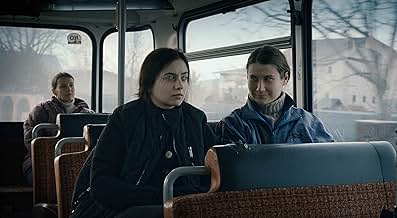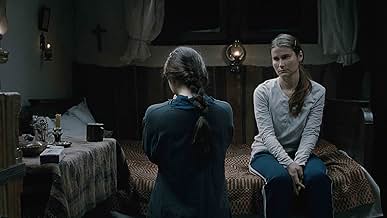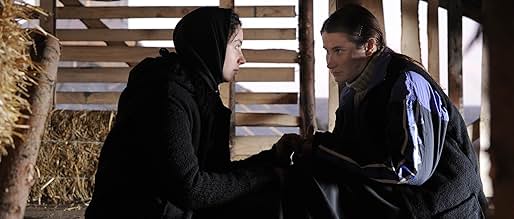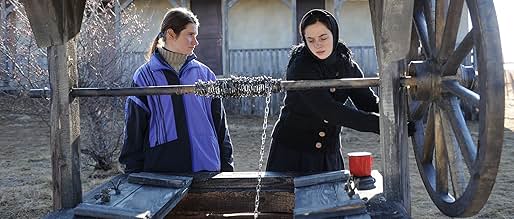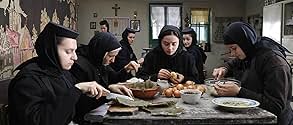IMDb RATING
7.5/10
14K
YOUR RATING
The friendship between two young women who grew up in the same orphanage; one has found refuge at a convent in Romania and refuses to leave with her friend, who now lives in Germany.The friendship between two young women who grew up in the same orphanage; one has found refuge at a convent in Romania and refuses to leave with her friend, who now lives in Germany.The friendship between two young women who grew up in the same orphanage; one has found refuge at a convent in Romania and refuses to leave with her friend, who now lives in Germany.
- Director
- Writers
- Stars
- Awards
- 8 wins & 19 nominations total
Valeriu Andriuta
- Priest
- (as Valeriu Andriutã)
- Director
- Writers
- All cast & crew
- Production, box office & more at IMDbPro
Featured reviews
The Romanian film Dupa Dealuri (2012) was shown in the U.S. with the title "Beyond the Hills." The movie was written and directed by Cristian Mungiu.
A better name for this film would have been "Beyond the City," because the movie takes place in a Romanian convent where conditions are basically medieval--no electricity, no running water, no central heating. Ironically, the convent overlooks a modern city. When anyone from the convent visits the city, we are jarred into remembering that the action is happening today, rather than 500 years ago. A group of nuns live in the convent, which is directed by an Orthodox priest and his wife, who is the mother superior.
Two young women grew up together in an orphanage, and then separated. One of the friends, (Volchita, played by Cosmina Stratan) has joined the convent. The other (Alina, played by Cristina Flutur) has gotten work in Germany. When Alina returns to visit Cosmina at the convent, the movie appears destined to be about a liberated woman freeing her more traditional friend from the repressive religious, patriarchal, atmosphere of the convent. That's not the direction the film takes.
We learn that Alina is desperate to be with Cosmina. She wants Cosmina to leave the convent and join her in Germany. It's Alina who is troubled. Cosmina is happy at the convent, and truly believes that Alina belongs there as well.
I assumed that the convent would be a place of repression and degradation, but that isn't the case. The life is hard, but the nuns are not mistreated, and they don't appear to have been brainwashed into accepting the strict rules set down by the priest (played by Valeriu Andriuta).
The interactions between the outsider--Alina--with Cosmina and the nuns and priest take turns and twists that I wouldn't have predicted. It's a hard, cold life at the convent, and this is a hard, cold portrayal of that life, and what happens when that life is disturbed.
Beyond the Hills is a grim, but fascinating, movie about good intentions meeting harsh reality. The acting and cinematography are superb. It's definitely worth seeking out and viewing.
We saw this film at the excellent Dryden Theatre at George Eastman House in Rochester. It will work well on DVD. Beyond the Hills was submitted as the Romanian entry in the 2013 Academy Awards Best Foreign Language Film category.
A better name for this film would have been "Beyond the City," because the movie takes place in a Romanian convent where conditions are basically medieval--no electricity, no running water, no central heating. Ironically, the convent overlooks a modern city. When anyone from the convent visits the city, we are jarred into remembering that the action is happening today, rather than 500 years ago. A group of nuns live in the convent, which is directed by an Orthodox priest and his wife, who is the mother superior.
Two young women grew up together in an orphanage, and then separated. One of the friends, (Volchita, played by Cosmina Stratan) has joined the convent. The other (Alina, played by Cristina Flutur) has gotten work in Germany. When Alina returns to visit Cosmina at the convent, the movie appears destined to be about a liberated woman freeing her more traditional friend from the repressive religious, patriarchal, atmosphere of the convent. That's not the direction the film takes.
We learn that Alina is desperate to be with Cosmina. She wants Cosmina to leave the convent and join her in Germany. It's Alina who is troubled. Cosmina is happy at the convent, and truly believes that Alina belongs there as well.
I assumed that the convent would be a place of repression and degradation, but that isn't the case. The life is hard, but the nuns are not mistreated, and they don't appear to have been brainwashed into accepting the strict rules set down by the priest (played by Valeriu Andriuta).
The interactions between the outsider--Alina--with Cosmina and the nuns and priest take turns and twists that I wouldn't have predicted. It's a hard, cold life at the convent, and this is a hard, cold portrayal of that life, and what happens when that life is disturbed.
Beyond the Hills is a grim, but fascinating, movie about good intentions meeting harsh reality. The acting and cinematography are superb. It's definitely worth seeking out and viewing.
We saw this film at the excellent Dryden Theatre at George Eastman House in Rochester. It will work well on DVD. Beyond the Hills was submitted as the Romanian entry in the 2013 Academy Awards Best Foreign Language Film category.
A girl visits a convent to try and bring her friend home.
Starring Cosmina Stratan and Cristina Flutur.
Written by Cristian Mungiu. Inspired by the Non Fiction Novels of Tatiana Niculescu Bran.
Directed by Cristian Mungiu.
This is a dark and disturbing movie that would have been far better if it wasn't so slow paced.
It moves at a snails pace but maybe that's what Cristian Mungiu intended, after all I'm guessing that's how things flow in a convent. The story isn't bad and as far as I could tell ( this was a Romanian movie with English subtitles) the acting was okay without being incredible.
I liked the outside location cinematography but the indoor stuff looked a bit wobbly. This is an arty film and usually I like anything like this but for me this was too slow and bordering on boring. For me it lacked something but I'm not sure what. Maybe the relationship between the two main characters could have been explored more to make this more watchable? We only get a few suggestions of a love affair in the past between them both and so perhaps that's what this movie needed.
It does make you think. It's pretty much an anti religious movie and that's the message that came across clearly at the end.
7/10
Starring Cosmina Stratan and Cristina Flutur.
Written by Cristian Mungiu. Inspired by the Non Fiction Novels of Tatiana Niculescu Bran.
Directed by Cristian Mungiu.
This is a dark and disturbing movie that would have been far better if it wasn't so slow paced.
It moves at a snails pace but maybe that's what Cristian Mungiu intended, after all I'm guessing that's how things flow in a convent. The story isn't bad and as far as I could tell ( this was a Romanian movie with English subtitles) the acting was okay without being incredible.
I liked the outside location cinematography but the indoor stuff looked a bit wobbly. This is an arty film and usually I like anything like this but for me this was too slow and bordering on boring. For me it lacked something but I'm not sure what. Maybe the relationship between the two main characters could have been explored more to make this more watchable? We only get a few suggestions of a love affair in the past between them both and so perhaps that's what this movie needed.
It does make you think. It's pretty much an anti religious movie and that's the message that came across clearly at the end.
7/10
Mungiu has managed in his films a perfect balance between portraying specific Romanian social-cultural issues and in the same time rendering them universal for the public abroad. He touches some of the Romanian taboos like the Orthodox church and its often brainwash practises, the efficiency of God-like doctors or the dark side of some of the do-gooders in social aid and work. The irony is that while all the characters in the film proclaim often and loud that they are sympathetic towards the orphan girl they are also the authors of her greatest abuses , from financial rip off to medical neglect or physical restraint .The system itself is rejecting the poorest and most vulnerable young people as is pointed out throughout the film by the recurrent motif of 'we have nowhere to go' leaving them in the hands of an often merciless world .In the very best of tradition of the superstitious Christian Romanian culture the real problems are avoided as they will throw a negative light back on everyone so it is easiest to blame all on evil spirits .The last scene gives a great insight into an emotionally devoid society , when such individual drama will become another media circus headline.
Well,I wanted desperately, not to like, to love this movie... All the premises were there, I couldn't wait for the film to be released... But, as the film was developing in front of my eyes, I was completely feeling less...No attachment to the girls, I didn't even care for one damn second about any of them, the film scratches everything that is supposed to carve upon, the director seems in a hurry to reach something that slips between his fingers...I felt no compassion for that girl, in some moments I was about to scream to her, get out of that place, girl, return to Germany, live your life and put ourselves out of the misery of watching this movie!And one more thing. The performances of both girls, cumulated, multiplied by 100, they never, ever, never ever, are any close to the magnificent performance of Emanuelle Riva in Amour... So , Nanni Moretti, I don't really know what came to your mind when you gave that award to these two, frustrating the beautiful Riva of that super-deserved award
A complex story plot describing a tragic division of life paths of two female friends who found themselves either into grinding mill of bigotry in church structures or into that of a cold bureaucratic apparatus. This poetically told story leads us through meditative winter landscapes and dark interiors of the monastery where, besides obvious social issues, one can vaguely discern a disturbing relationship between the two friends consisting of perplexing resignation and self-destruction. The success of this work lies in the abundance of details which bring the audience into contemplation about human nature.
Did you know
- TriviaFilmed and edited simultaneously in chronological order.
- ConnectionsFeatured in At the Movies: Cannes Film Festival 2012 (2012)
- How long is Beyond the Hills?Powered by Alexa
Details
- Release date
- Countries of origin
- Official sites
- Language
- Also known as
- Beyond the Hills
- Filming locations
- Campina, Romania(location)
- Production companies
- See more company credits at IMDbPro
Box office
- Gross US & Canada
- $124,919
- Opening weekend US & Canada
- $14,622
- Mar 10, 2013
- Gross worldwide
- $673,493
- Runtime
- 2h 32m(152 min)
- Color
- Sound mix
- Aspect ratio
- 2.35 : 1
Contribute to this page
Suggest an edit or add missing content


